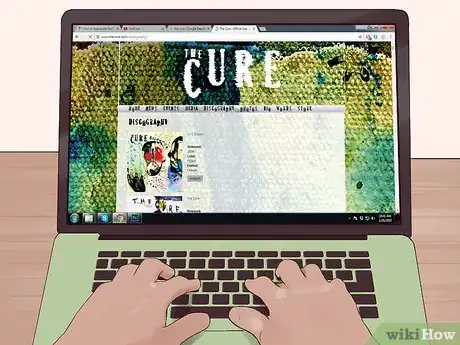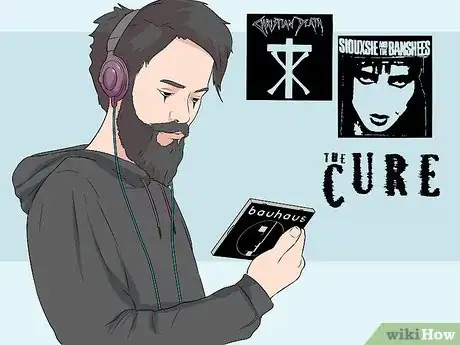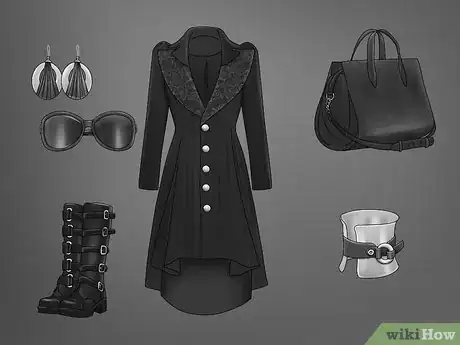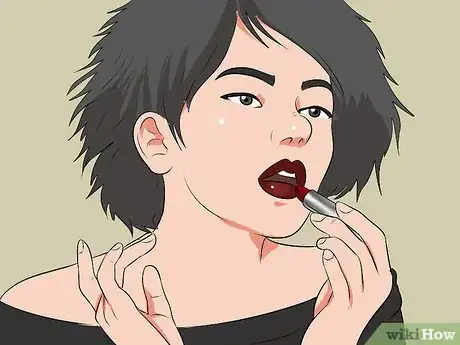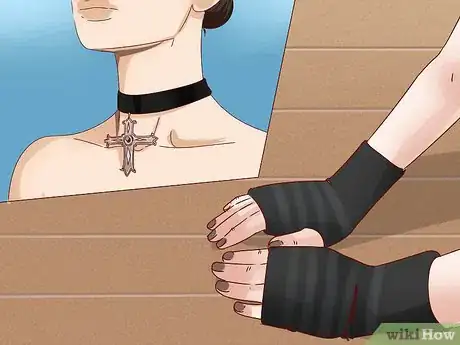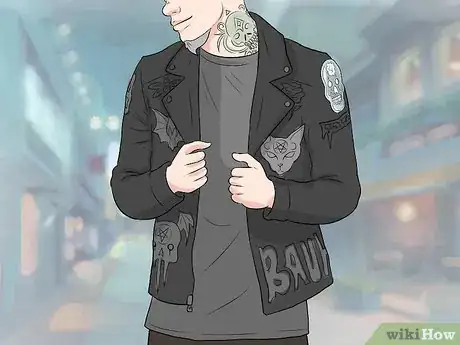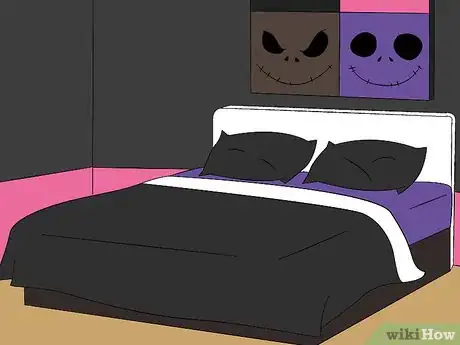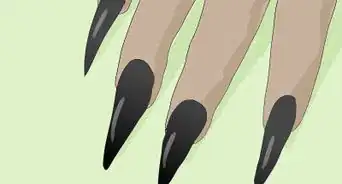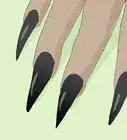This article was co-authored by Jordan Stolch. Jordan Stolch is an Image Strategist, Style Advisor, and the Founder of MiKADO - a concierge personal styling firm. With over a decade of experience, Jordan specializes in helping people eliminate the confusion and insecurities associated with how to dress in order to build a powerful image and use clothing to their strategic advantage. Jordan trains entrepreneurs, business leaders, and corporate executives in the foundations of "power dressing", from some of the country's preeminent companies such as Morgan Stanley, Deloitte, Berkshire Hathaway, Universal Music Group, Starbucks, and Disney. She works with clients both in-person and virtually, teaching them how to take the confusion out of style so they can operate at a higher level. Jordan earned her BA in Psychology from the University of Waterloo and studied Merchandise Marketing at the Fashion Institute of Technology (FIDM).
There are 49 references cited in this article, which can be found at the bottom of the page.
wikiHow marks an article as reader-approved once it receives enough positive feedback. This article has 18 testimonials from our readers, earning it our reader-approved status.
This article has been viewed 1,228,236 times.
The dark world of goths is one of the most diverse and healthy subcultures, flourishing in all kinds of communities worldwide. The spooky, ghoulish look and dark clothes is an instantly striking style. But when other goths in white-out contact lenses start throwing around terms like "ethereal chill wave" and quoting from The Moonstone it can be somewhat intimidating. Starting slow and working your way into the goth subculture can be an immensely rewarding experience for anyone looking to join the community.
Steps
Listening to Goth Music
-
1Learn the history of the goth subculture. Knowing your background and history of the subculture you are developing yourself into is a very vital part of being goth. This helps you get past the baby bat stage (a "baby bat" is someone who is new to the subculture) and into maturing into the culture, music and fashion. Some important facts about goth are:
- In the year 1967, the American band The Doors were described as "gothic rock" and in 1974 Bowie's Diamond Dogs was called "gothic".[1] However, it doesn't make the artist or band goth.
- Some people cite Nico as the first to record a gothic album; either The Marble Index or The End.[2]
- The song credited to have birthed the goth rock genre is the 1979 single Bela Lugosi's Dead by Bauhaus.[3] [4] [5] Peter Murphy, lead singer of the band, said that the song was supposed to be written tongue-in-cheek and that their mistake was performing it naive seriousness, which changed the way the audience understood it.[6] This song was also played at the beginning of The Hunger, a film popular among goths.[7]
- Goth rock or gothic rock is a sub-genre of punk rock which was born out of the British post punk scene in the late 70s / early 80s.[8]
- A nightclub in London named "The Batcave" was opened in 1982[9] [10] [11] [12] by members of Specimen that catered towards this new flourishing scene. Although the club never named themselves as a "goth club", the club helped bring all the forming elements of goth together.[13]
- The subculture took inspiration from Gothic architecture such as castles and cathedrals; the Romantic movement originating from the late 1700 and 1800 century and Gothic literature such as The Castle of Otranto by Horace Walpole where the use of the word "Gothic" was first used in literature[14] , Frankenstein by Mary Shelley, Dracula by Bram Stoker and the works of Edgar Allan Poe.[15] [16]
- Goth subculture draws inspirations from ancient Celtic, Pagan, Egyptian and Christian mythology and religions and goth fashion combines high chic, antique, retro-kitsch, punk, fetish and secondhand trash elements[17]
-
2Learn what goth music is. Members of the subculture consider listening to and appreciating goth rock, post punk, deathrock and darkwave music to be an important part of being goth. Many goths listen to many other different genres, too, but there are certain ones which are considered goth whereas others are considered goth-friendly. It doesn't mean you can't listen to them, it just means that you won't make you "goth" if you only listen to those goth-friendly genres.Advertisement
-
3Understand the characters and different offshoots of goth music. Goth is not only limited to goth rock, but includes some post-punk, deathrock, darkwave, ethereal wave, grey rock and afterpunk. Grey rock is the Portuguese term for post-punk / goth rock and afterpunk is the Spanish term.
- Deathrock, which is the American counterpart that formed around the same time as goth did in the UK. Developed in Southern California, deathrock is a spooky and atmospheric offshoot of punk rock which consists of glam rock imagery, punk-inflected sound and attitude, shock rock theatrics and b-movie inspiration. Notable bands are Christian Death, 45 Grave and Kommunity FK.[20]
- Darkwave, an offshoot of goth rock that formed in the 80s. It combines elements of synthpop and new wave, incorporating dark, introspective lyrics and an undertone of sorrow. However the term, originally starting out as a post punk style, eventually became its own thing as bands started to make greater use of synthesizers and drum machines. Notable bands include Clan of Xymox, Dead Can Dance and Black Tape For a Blue Girl. Fans of darkwave are called "darkwavers".[21]
- Coldwave, a subgenre of darkwave first coined by British writer Vivien Goldman in an article that review the Siouxsie and the Banshee's album The Scream. The sound mainly became popular in France and Belgium in the 90s but has since spread to other continents. Notable bands include Charles De Goal, Memorial Voice and Ruth.[22]
- Ethereal wave, a subgenre of darkwave which has been described as "gothic", "otherworldly" and "romantic". It was developed in the early 80s, and is mainly represented by bands from the British independent record label, 4AD.[23] [24] Notable bands include Cocteau Twins,This Mortal Coil and Dead Can Dance.[25]
-
4Find goth bands you like and listen to the lyrics. Goth music places a great emphasis on the lyric and matching the lyric with creating a mood. Many early vocalists aimed for a Leonard Cohen-like dirge to focus on the words in the song. Start with the most popular Goth songs like A Forest by The Cure, Bela Lugosi's Dead by Bauhaus and Cities In Dust by Siouxsie and the Banshees.
- Learn the words to your favorite goth songs by copying out lyrics in a notebook. Knowing the words to your favorite songs can be a quick way to make friends with other goths, if you're into the same things.
- If you need some help, some notable goth albums include:
- Joy Division - Closer (1980)
- The Cure - Pornography (1982)
- Siouxsie and the Banshees - Juju (1981)[26]
- Bauhaus - Bela Lugosi's Dead (1979)[27]
- The Birthday Party - Release The Bats (1981)
- The Sisters of Mercy - Floodland (1987)[28]
- Black Tape for a Blue Girl – Remnants of a Deeper Purity (1996)
- Christian Death - Only Theatre of Pain (1982)
-
5Develop your music taste. Learning and listening to the most popular goth bands are good, and they will definitely earn you goth points on your goth card (see "goth slang") but finding underground or local goth bands is something you should definitely do, too. Most people stop at the most popular goth bands, but the most recent and underground ones deserve some recognition, in order to keep the goth scene alive.
- Check the "goth/alternative rock" sections of Discogs, Bandcamp.com, Last.fm and Soundclick.com and see what you can find. Be warned, though, because a lot of music is usually mislabelled and is actually metal, EBM or electronic which are separate scenes/genres of music.
- Ask other goths for their Last.fm, personal goth playlists and Bandcamp profiles.
- Use dark/alternative radio stations to find other goth/alternative bands such as nightbreedradio.com, and deathrockradio.
-
6Start listening to modern goth bands. Believe it or not, goth isn't just "an 80s genre" like some people believe. But it hasn't just stayed stagnant, either. The deathrock revival of the 00s showed bands dressing more colourfully and adding into their sound, but not in a way that changed it into something completely different. All Gone Dead are a good example of this. Darkwave bands mixing minimal wave into their music has become more prevalent, bands such as Boy Harsher, Hante and TRAITRS being a good example of this. Check out some of these modern bands on Bandcamp and YouTube. Bands include:
- NU:N
- Lebanon Hanover
- Ash Code
- She Past Away
- Drab Majesty
- Boy Harsher
- TRAITRS
- Cold Cave
- Hante
- Angels of Liberty
- Grooving in Green
- Delving into modern artists means you have more chance of seeing them live as they are more likely to be active. Check BandsInTown and your favourite bands' social media/official website to see if they're in your area.
Dressing the Part
-
1Wear black.[29] Learn the basics of traditional goth fashion. During the days of when the scene was new, the goths did not know or have a set image as to what goth looked like. They just made it up as they went along, but as goth is a certain style, similarities showed among the members.[30] There are many so called "goth" styles out there, however, traditional goth, deathrock and romanticgoth (the style of dress a lot of goth bands wore in the 90s) are the only ones that are goth whereas other types take inspiration or mix goth fashion characteristics in with other styles, making it become its own thing. Goth fashion includes:
- Darker colours, including purple and blood red[31]
- Satin bodices and corsets[32]
- Striped stockings and tights[33]
- Frilly or lace gloves
- Lace skirts
- DIY leather jacket, usually of favourite goth band logos
- Sheer stockings and suspenders
- Fishnet tights[34] [35]
- Winklepickers[36] , spiked heels, pointy-toe lace-ups, shiny thigh high boots or Doc Martens[37]
- Garments of leather, lace, velvet, silk or PVC[38]
- To capture the goth look, you have to invest in interesting fabric or interesting details. So, look for pieces which have leather accents, chain studding, contrasting fabric, etc.[39]
-
2Dye and style your hair. Hair has always been an important part of shock tactic method of goth, and it usually takes longer than preparing your outfit or make up.
- During the Batcave days, Siouxsie Sioux inspired girls to back comb their hair to uttermost heights and Patricia Morrison of The Sisters of Mercy influenced others to leave their hair long and black[40]
- Bauhaus, Robert Smith of The Cure, Specimen and Dave Vanian all influenced men's fashion and Jonny Slut, keyboardist of Specimen became the face of the band due to his elaborate style and huge, backcombed and hairsprayed death hawk.[41]
- However, you don't need to do anything too extreme everyday. If you prefer to have it long and black, perhaps choppy, you can. There aren't any rules on hair, but goth does have its style. If you're interested in having a certain style you can look up tutorials on YouTube.
-
3Wear makeup. Like goth fashion, goth makeup looks a certain way too. Makeup is based off how the original goth artists used to wear their makeup. Some ideas for goth makeup include:
- Egyptian / Cleopatra inspired eye makeup, much like how Siouxsie Sioux wore hers or solid blocks of blue, purple or metallic eyeshadow.
- Deathbrows, popularised by Daniel Ash. They were drawn on in black and then flared upwards, don't be afraid to experiment with eyeliner and eyeshadow while drawing "deathbrows".
- Female eyebrows were either thin and high arched like Morticia Addams or pointed, triangular and thick like Siouxsie Sioux. If you don't necessarily like the style you don't have to wear it; create your own version, but a lot of fans of the music dressed like this because they were influenced by their idols.[42]
-
4Accessorize. The more accessories you tend to add, the better your outfit looks. There are tons of accessories that go together with different themed outfits, for example you have fake fangs for a vampire outfit, a corset for a romantic outfit and sunglasses for a traditional outfit. Look for pieces that are unique and different to accentuate your gothic look.[43]
- Other goth accessories include:
- Piercings, including lip, eyebrows, tongues and belly buttons[44]
- Sunglasses (much like The Sisters of Mercy), top hats, capes, cravats, riding crops or lunchbox purses. Piercings and colorful contact lenses and fake fangs are also popular.[45]
- Silver jewellery such as silver skulls, human skeletons and bats or religious imagery like crosses made into chunky rings, brooches and necklaces.[46]
- Nail polish. Black, purple and blood red were incredibly popular colours with goths.[47] [48]
- Generally, goth fashion items have interesting fabrics or details, like pieces that have leather accents, chain studding, contrasting fabric, and anything else that's a little unique.[49]
- Other goth accessories include:
-
5Go thrifting and prepare some DIY. In the original scene, goths did not have complete stores to shop at. They had their creativity and what they found in local thrift stores to work with, meaning there was no "set" goth style (although it ended up looking similar in the end). As punk is DIY, that means goth is too, and will always be a big part of it. Start experimenting with clothes yourself, and make sure they are cheap enough so that if you mess up, you aren't too bothered about it. There are several goth DIY tutorials on YouTube and on blogs to follow if you have no ideas. Meanwhile, some simple tips include:
- Buy or paint patches of your favourite band/anything from Etsy.com and eBay and sew them onto your jacket/garment of clothing.
- Buy or make your own goth band/logo pins and do the same to them as you did with the patches.
- Learn how to make jewellery, you can even sell it and begin your own business.
- Cut up old clothes with patterns on and stitch patches onto clothes. Tartan or leopard print patches look great against black jackets.
- Buy some safety pins and get creative with them, use them to pin jackets together or simply make patterns on your clothes.
- Bleach clothes to create permanent patterns in them.
- Clothes that have creative distressing, whether that's rips, tears, or just unique necklines, can contribute to your goth look.[50]
Getting into the Mindset
-
1Create a comfortable space for yourself. Fill your room or your basement with sensuous surroundings: think gothic in terms of light, color, and sound. Put posters on the walls of your favorite bands and hand dark draperies on the walls to soundproof your space, so you can play your music as loud as you want without disturbing the rest of your family. Creating a space for yourself will put you in a headspace where you’re better shielded from the negativity of others. Since many goths are artists, writers, or musicians, it will also help you tap into the creativity and individuality that is such a big part of the subculture.
-
2Read gothic novels. Plenty of goths enjoy reading gothic literature. However, it influenced the goth subculture and isn't actually part of it, so reading gothic fiction alone won't make you goth. People were only starting to be called goth because they were into the music. Regardless, you can still enjoy it and indulge in the dark atmospherics that the genre has to offer. Some gothic works you may want to check out are:
- Dracula by Bram Stoker
- Frankenstein by Mary Shelley
- Interview With the Vampire by Anne Rice
- The Castle of Ontranto by Horace Walpole
- Wuthering Heights by Emily Brontë
- Zastrozzi by Percy Bysshe Shelley
- Anything by Edgar Allan Poe, especially his poem The Raven
- Also read gothic poetry and try writing your own. William Blake's Songs of Innocence and Experience is a classic in goth poetry, as well as Sylvia Plath's Ariel.
-
3Enjoy the creativity of the subculture. Express yourself. Write poetry, paint, or take photographs, especially black and white photographs. Start a band and play goth music. The goth subculture is full of creative people who like to participate in that culture.
- Oftentimes, people don't understand or respect the goth subculture. If someone is giving you trouble, just walk away. Don’t waste time arguing. Being friendly and kind to everyone and you might change their perception of goths for the better.
-
4Listen to yourself. Don't let anyone tell you what to do, including other goths. If The Cure doesn't do it for you, but you are really into Johnny Cash, so be it. Don't let anyone tell you you're not "goth enough" for superficial and otherwise unimportant reasons. The most important thing is that you're you, and you're trying to participate in a community that accepts that.[51]
- Develop your own style naturally. If you have a genuine interest in a scene, you will naturally be influenced as you get into the subculture. Do what makes you happy.
Getting Involved with the Community
-
1Take part in Goth events, festivals and clubs. Every year, and in several different countries across the world, goth clubs are open and festivals are planned. You can really take part in the goth community if you attend these and listen to what other goths have to say, especially since there will be people who have been into the subculture for 30 years or more, or even since it was born.
- Some festivals, events and clubs are as listed:
-
2Learn goth slang.[57] Goth slang is an inside joke within the community and by becoming familiar with the terms, you may feel more at home.
- Some goth slang phrases and their definitions are as followed:
- Goth Points. A fictional points system which, every time you do something particularly gothy (example, listening to Bauhaus while dying your hair a shade of ebony), adds points to your card.
- Goth Card. A fictional card which stores "goth points" as shown above.
- Baby bat. A new and willing to learn member of the subculture. This is different to a poseur.
- Goth In a Box. A term to describe someone who dresses in complete outfits from Hot Topic. This is frowned upon as goth has its roots in individualism and DIY.
- Bat-caver. A frequent visitor of the 1982 nightclub The Batcave, but now refers to someone who is an older goth and was a fan of the music played there.[58]
- Some goth slang phrases and their definitions are as followed:
-
3Teach people about goth. As a member of the subculture, it's important that you teach baby bats and people willing to learn about the scene. This stops the spreading of misinformation and gives baby bats the correct information they need to be able to develop into the subculture. If the media's "definition" of goth reaches them first, they may feel they're obliged to participate in negative stereotypes like attempting to worship the devil or self harming. Above all of this, too many baby bats have been unintentionally throwing goth customs and traditions that make goth what it is out of the window.[59]
- Forgetting the background, history and unifying elements of the subculture makes it lose all value and meaning. Without the background and history, goth would not be what it is today. Goth did not go from a complete social subculture with music and fashion relations to someone's opinion, or simply just a psychological "mindset".
Community Q&A
-
QuestionPeople are pressuring me to become a goth. What do I do?
 Community AnswerRemind them that goth culture is about self-expression. Forcing someone to conform goes against goth philosophy. As for yourself, feel free to explore the areas of goth culture that appeal to you. There's nothing wrong with wearing goth makeup but having different tastes in music, for example.
Community AnswerRemind them that goth culture is about self-expression. Forcing someone to conform goes against goth philosophy. As for yourself, feel free to explore the areas of goth culture that appeal to you. There's nothing wrong with wearing goth makeup but having different tastes in music, for example. -
QuestionWhy do some goths wear Edwardian clothing?
 Community AnswerGoth fashion is more diverse than many people realize. Medieval, Victorian, and Edwardian fashion are all popular in some goth circles. Note that some goths use the word "Edwardian" to refer to the artist and writer Edward Gorey, instead of the historical period.
Community AnswerGoth fashion is more diverse than many people realize. Medieval, Victorian, and Edwardian fashion are all popular in some goth circles. Note that some goths use the word "Edwardian" to refer to the artist and writer Edward Gorey, instead of the historical period. -
QuestionWhat do I do if I get teased for being a goth?
 Community AnswerTry not to react, as this will encourage them to keep teasing you. Severe or constant teasing is a form of bullying, which you can report to an adult. You may need to talk to more than one adult, or remind them of the school bullying policy.
Community AnswerTry not to react, as this will encourage them to keep teasing you. Severe or constant teasing is a form of bullying, which you can report to an adult. You may need to talk to more than one adult, or remind them of the school bullying policy.
Warnings
- Contrary to mainstream belief, goth is not a cult, religion, lifestyle or mindset. A lifestyle is "a way a person lives", a subculture is defined as "cultural group within a larger culture, often having beliefs or interests at variance with those of the larger culture." "Gothic" more than "goth" could be considered a lifestyle due to it being a style, but goth subculture is based around goth music.⧼thumbs_response⧽
- Some people throw around the "elitist" term a lot these days, and that's because there's a lot of people who stick to the background, history and roots of the subculture. Some people do not think like this and instead, think that goth is "whatever you want it to be". This is wrong as all types of media show that goth has roots tracing back to the punk subculture.⧼thumbs_response⧽
- Don't believe online quizzes which determine what subculture [or, the word some people use, stereotype] you are part of. Most are often inaccurate as most creators of these quizzes haven't done any research or have made one for a bit of fun; not intended to take it seriously.[61]⧼thumbs_response⧽
References
- ↑ http://rateyourmusic.com/list/Draconysius/goth_-the-history_-the-heresy/
- ↑ http://www.gothicsubculture.com/articles/undead.php
- ↑ http://www.gothicsubculture.com/origin.php
- ↑ Venters, J (2009), Gothic Charm School, Am I a Goth?, p.9 ISBN 978-0-06-166916-3
- ↑ Roberts, C, Livingstone, H and Baxter-Wright, E, (2014), Goth: The Design, Art and Fashion of a Dark Subculture, Music, p.133 ISBN 978-1780978864
- ↑ http://www.gothicsubculture.com/articles/undead.php
- ↑ http://www.rollingstone.com/movies/pictures/the-30-greatest-rock-roll-movie-moments-20130221/20-bauhaus-bela-lugosis-dead-in-the-hunger-1983-0693481
- ↑ Venters, J, (2009), Gothic Charm School, Am I a Goth?, p.7 ISBN 978-0-06-166916-3
- ↑ Harriman, A and Bontje, M, (2014), Some Wear Leather, Some Wear Lace, Everyday is Halloween, p.34 ISBN 978-1783203529
- ↑ Venters, J, (2009), Gothic Charm School, Am I a Goth?, pp.9-10 ISBN 978-0061669163
- ↑ Goodlad, L and Bibby, M, (2007), Goth: Undead Subculture, Introduction, p.2 ISBN 978-1783203529
- ↑ Roberts, C, Livingstone, H and Baxter-Wright, E, (2014), Goth: The Design, Art and Fashion of a Dark Subculture, Music, p.134 ISBN 978-1780978864
- ↑ Polhemus, T, (1994), Street Style: From Sidewalk to Catwalk, goths, p.97 ISBN 978-0500277942
- ↑ https://www.bl.uk/romantics-and-victorians/articles/the-origins-of-the-gothic#
- ↑ Venters, J, (2009), Gothic Charm School, Am I a Goth?, pp.7-8 ISBN 978-0-06-166916-3
- ↑ Roberts, C, Livingstone, H and Baxter-Wright, E, (2014), Goth: The Design, Art and Fashion of a Dark Subculture, Fiction, p.55 ISBN 978-1780978864
- ↑ Goodlad, L and Bibby, M (2007), Goth: Undead Subculture, Introduction, p.2 ISBN 978-0822339212
- ↑ Harriman, A and Bontje, M, (2014), Some Wear Leather, Some Wear Lace, A New Dark Age, p.22 ISBN 978-1783203529
- ↑ Hodkinson, P, (2002), Goth: Identity, Style and Subculture, The Emergence of a Style, p.36 978-1859736050
- ↑ Rate Your Music. (n.d.). Deathrock. [online] Available at: https://rateyourmusic.com/genre/Deathrock/ [Accessed 8 Jul. 2018].
- ↑ Rate Your Music. (n.d.). Darkwave. [online] Available at: https://rateyourmusic.com/genre/Darkwave/ [Accessed 8 Jul. 2018].
- ↑ Oglba, J. (2012). A Brief History Of Musical Waves From NEW To NEXT. [online] Noisey. Available at: https://noisey.vice.com/en_us/article/rkq3wr/a-brief-history-of-musical-waves-from-new-to-next [Accessed 8 Jul. 2018].
- ↑ Bonner, S. (1988). Print. Reflex Magazine. [online] Available at: https://web.archive.org/web/20110624075846/http://www.cocteautwins.com/html/media/print/reflex_sep88.html [Accessed 6 Aug. 2018].
- ↑ Fredperry.com. (2013). Facing The Other Way: The Story of 4AD. [online] Available at: https://www.fredperry.com/subculture/article-facing-the-other-way-the-story-of-4ad-1 [Accessed 6 Aug. 2018].
- ↑ Doherty, J. (1985). Despite strong talent, group packs weak punch. The Cavalier Daily, [online] p.8. Available at: https://news.google.com/newspapers?nid=1807&dat=19851108&id=cekhAAAAIBAJ&sjid=1XEEAAAAIBAJ&pg=3986,3280578 [Accessed 6 Aug. 2018].
- ↑ Spectrum Culture. (2013). 13 Best Goth Albums of All Time - Spectrum Culture. [online] Available at: http://spectrumculture.com/2013/03/21/13-best-goth-albums-of-all-time/ [Accessed 9 Jul. 2018].
- ↑ FACT Magazine: Music News, New Music. (2010). 20 best: Goth records ever made - FACT Magazine: Music News, New Music.. [online] Available at: http://www.factmag.com/2010/11/02/20-best-goth/ [Accessed 9 Jul. 2018].
- ↑ Rowley, S. (2016). The Top 10 Essential Goth Albums. [online] Classic Rock Magazine. Available at: https://www.loudersound.com/features/the-top-10-essential-goth-albums [Accessed 9 Jul. 2018].
- ↑ Jordan Stolch. Image Consultant & Style Advisor. Expert Interview. 25 September 2020.
- ↑ Harriman, A and Bontje, M, (2014), Some Wear Leather, Some Wear Lace, Everyday is Halloween, p.34 ISBN 978-1783203529
- ↑ Hodkinson, P, (2002), Goth: Identity, Style and Subculture, The Emergence of a Style, p.47 ISBN 978-1859736050
- ↑ Venters, J, (2009), Gothic Charm School, Am I a Goth?, pp.11 ISBN 978-0061669163
- ↑ Polhemus, T (1994), Street Style: From Sidewalk to Catwalk, goths, p.97 ISBN 978-0500277942
- ↑ Roberts, C, Livingstone, H and Baxter-Wright, E, (2014), Goth: The Design, Art and Fashion of a Dark Subculture, Fashion, p.181 ISBN 978-1780978864
- ↑ Hodkinson, P, (2002), Goth: Identity, Style and Subculture, The Emergence of a Style, pp.36 - 49 ISBN 978-1859736050
- ↑ Harriman, A and Bontje, M, (2014), Some Wear Leather, Some Wear Lace, Winklepickers, p.202 - 207 ISBN 978-1783203529
- ↑ Goodlad, L and Bibby, M (2007), Goth: Undead Subculture, Introduction, p.3 ISBN 978-0822339212
- ↑ Goodlad, L and Bibby, M (2007), Goth: Undead Subculture, Introduction, p.3 ISBN 978-0822339212
- ↑ Jordan Stolch. Image Consultant & Style Advisor. Expert Interview. 25 September 2020.
- ↑ Harriman, A and Bontje, M, (2014), Some Wear Leather, Some Wear Lace, Painted bird, p.66 ISBN 978-1783203529
- ↑ Harriman, A and Bontje, M, (2014), Some Wear Leather, Some Wear Lace, Painted bird, p.66 ISBN 978-1783203529
- ↑ Harriman, A and Bontje, M, (2014), Some Wear Leather, Some Wear Lace, Painted bird, p.68 ISBN 978-1783203529
- ↑ Jordan Stolch. Image Consultant & Style Advisor. Expert Interview. 25 September 2020.
- ↑ Hodkinson, P, (2002), Goth: Identity, Style and Subculture, Femininity and Ambiguity, pp.48 ISBN 978-1859736050
- ↑ Goodlad, L and Bibby, M (2007), Goth: Undead Subculture, Introduction, p.3 ISBN 978-0822339212
- ↑ Roberts, C, Livingstone, H and Baxter-Wright, E, (2014), Goth: The Design, Art and Fashion of a Dark Subculture, Fashion, p.181 ISBN 978-1780978864
- ↑ Goodlad, L and Bibby, M (2007), Goth: Undead Subculture, Introduction, p.3 ISBN 978-0822339212
- ↑ Harriman, A and Bontje, M, (2014), Some Wear Leather, Some Wear Lace, Painted bird, p.66 ISBN 978-1783203529
- ↑ Jordan Stolch. Image Consultant & Style Advisor. Expert Interview. 25 September 2020.
- ↑ Jordan Stolch. Image Consultant & Style Advisor. Expert Interview. 25 September 2020.
- ↑ http://www.newscientist.com/article/dn8996-goth-subculture-may-protect-vulnerable-children.html#.UnKSfxa_P_c
- ↑ http://worldgothday.com/
- ↑ https://www.facebook.com/releasethebatsclub/
- ↑ http://www.whitbygothweekend.co.uk/
- ↑ http://www.wave-gotik-treffen.de/english/
- ↑ https://www.vamp.org/Gothic/clublist.html
- ↑ http://www.rebelcircus.com/blog/goth-slang-actually-means/
- ↑ http://igothablog.blogspot.co.uk/2007/11/goth-slang.html
- ↑ http://thegothicalice.tumblr.com/post/148950458874/the-problem-with-some-young-goths-and-the
- ↑ https://www.youtube.com/watch?v=XIcHD-cV9T0
- ↑ Venters, J, (2009), Gothic Charm School, Why you shouldn't believe everything you read on the Internet, including those silly quizzes, pp.25-29 ISBN 978-0-06-166916-3
About This Article
To be a Goth, wear black and dark purples, Doc Marten boots, and leather, which are popular in Goth fashion. You can also wear corsets, lace skirts, and fishnet tights to look more Goth. Additionally, accessorize with piercings, silver jewelry, and black nail polish. While dressing the part might be fun, being Goth is also about music, like post punk, deathrock, and darkwave. You can also read gothic novels, such as Dracula, Frankenstein, and Wuthering Heights, all of which indulge in dark atmospheres. To learn how to get involved with the Goth community, keep reading!

